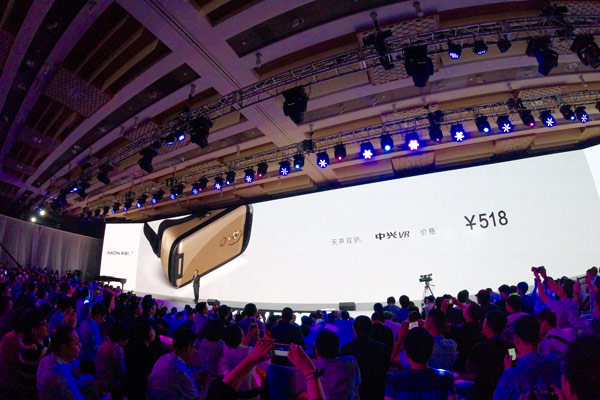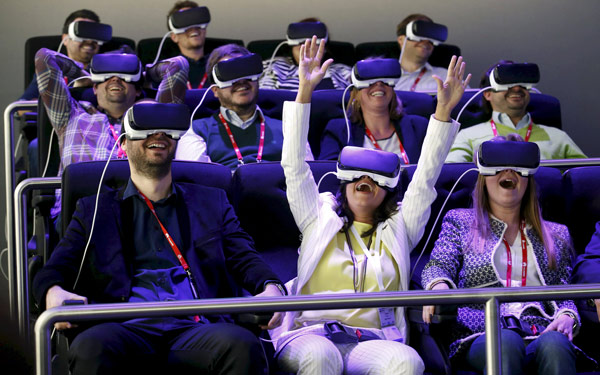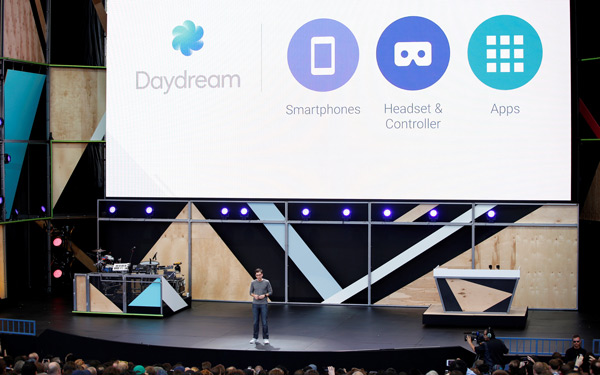 |
|
ZTE Corp?introduces ZTE VR headset on May 26, 2016 during the company's new flagship Axon 7 launch event held in Beijing. [Liu Zheng/chinadaily.com.cn] |
Chinese tech company ZTE Corp unveiled a brand new mobile-driven virtual reality (VR) headset on May 26, taking on the group lead by Samsung and Huawei in the mobile VR market.
Priced at 531 yuan ($80), the product is believed to be the company's answer to Samsung Gear VR, and it will let the company's new flagship Axon 7 users experience VR at a cheaper price, a big factor in the price sensitive market.
Nearly one and half month ago, one of ZTE's competitors -- Huawei - unveiled its mobile VR headset, which will be able to function with the company's newly launched flagships -- P9 and P9 Plus.
Compared with Huawei P9's 1,920 x 1,080 pixels display solutions, ZTE Axon 7 is a more pixel-dense phone with a 2K AMOLED screen, which will theoretically provide a smoother watching experience when you move your head with the wearable device displaying motion images about two inches from your eyeballs.
According to ZTE, the company is poised to become one of the first VR headset manufacturers to be compatible with the Google Daydream VR platform announced earlier this month at the tech giant's worldwide developers' conference -- Google IO 2016.
Although Google has not announced any detailed regulations for its "Daydream" platform, rumors have indicated that 4K display resolutions is a must for smartphones to demonstrate high-quality-required VR content in the future.
 |
|
People test Samsung Gear VR glasses at their stand during the Mobile World Congress in Barcelona, Spain February 23, 2016. [Photo/Agencies] |
The industry pioneer Samsung recently showcased 5.5-inch 4K display for mobile VR usage during the annual Display Week held in San Francisco.
Given that the industry will lure more phone makers to participate in VR, will it be a new selling point that will stimulate the market or a new concept that will fulfill their users' experiences?
Todd Richmond, director of advanced prototypes at the University of Southern California Institute for Creative Technologies, expressed his optimism about the mobile VR's future. He said in an interview with the Institute of Electrical and Electronics Engineers this March: "VR/ augmented reality is likely to develop into the next smartphone -- it will replace a smartphone or incorporate its features, but it will take 10 years."
Kevin Curran, head of the British Ulster University's Ambient Intelligence and Virtual Worlds Research Team, agreed that there's still a long way to go for VR equipment to become must-have. Curran said: "After experiencing a long period of development, VR may become standard smartphone interface, the two being combined is not impossible."
 |
|
Clay Bavor, vice president of virtual reality at Google, introduces Daydream during the Google I/O 2016 developers conference in Mountain View, California May 18, 2016. [Photo/Agencies] |
Tan Ying, industry analysis of market research company GfK China, told China Daily that the reasons behind the smartphone-driven VR investment fever are the relatively low tech threshold to access the terminal device mass production and the potential stimulation that enables to boost the sales of the existing smartphone production lines."
"VR is one of the future trends that's still in its early days and requires years of improvements to become mature. It cannot replace smartphones overnight," said Ying.
From both the supply side and demand side of the mobile VR, "the smartphone-driven VR goggles will become a proper market access point for companies to educate their VR early adapters and it is a low-cost and efficient approach as most of the domestic buyers are not hardcore console players who are willing to purchase a high-end VR device," said Ying. "The cost is a big worry for users."
Ying said that a group of small VR manufacturers will not survive in near term and the market may witness a slowdown in the coming two years until a well recognized technology matures and user-friendly products pop up in the market.
